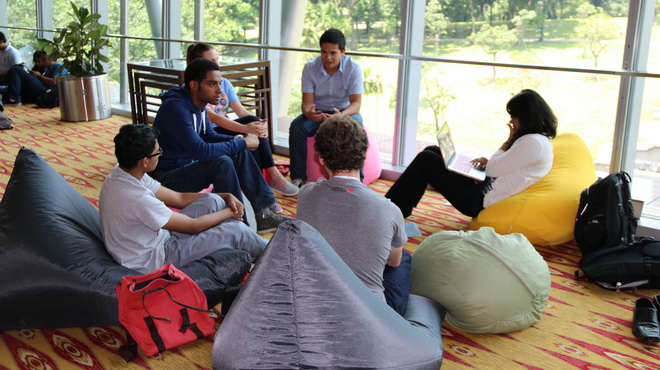A discussion session titled “Entrepreneurial University” at the 2013 Global Entrepreneurship Summit (GES) held in Kuala Lumpur on October 11 presented a new model of education that melds academics with the business environment
Business incubation environment
Experts at the 2013 GES emphasized that the university environment is considered effective for business incubation. Many universities in Malaysia are following the “entrepreneurial university” trend in which students are trained to be real businesspeople while at university. They learn business-related skills including critical and creative thinking and the ability to accept and overcome failure.
According to Rafik Guidi, co-founder of Egypt’s SilGenix Company, an “entrepreneurial university” is effective in developing potential businesspeople. Not only does it create a favorable environment for businesspeople to develop in, it increases competition in the field by adding more diversity and promoting creativity and innovation.
Many leading companies in the world such as Google began in the university environment. More than 6,000 companies in the US were developed based on incubated ideas within the education sector after the Bayh – Dole act was approved by US Congress.
Reports issued by the Hong Kong Institute of Education show that globalization is forcing Asian universities to transform into “entrepreneurial universities.”
According to Peter Ng, founder of UCSI Malaysia group, with the exception of Malaysia, the model is not well-known in Asia, but there are some universities in India and Thailand which have begun applying it to their education system.
Starting a business while studying
Roland Xavier, Associate Professor at Tun Abdul Razak University, claimed that Malaysia has already proposed many policies that enhance the development of the “entrepreneurial university” concept, including the establishment of the School of Business and Entrepreneurship in December 2007.
Besides developing small and medium-sized enterprises that help maintain the stability and diversity of the local business environment, the program also supports young entrepreneurs to overcome difficulties and materialize their business ideas.
“Students must start a business while studying at the university. If they do not have their own enterprise, they are unable to graduate,” Xavier explained.
Tun Abdul Razak University collaborates with Babson College, an American university considered a successful “entrepreneurial university” model. It allows students to borrow up to US$3,000 to begin their business. The profits from successful enterprises are sent to charitable organizations.
The “entrepreneurial university” model is welcome in the “real” business world, as it helps create more enterprises, Xavier said. This model will be important during the ASEAN integration in 2015, he added.





















































